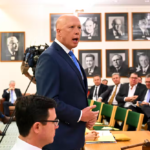Come out from your corporate corner
Many companies often automatically hide behind industry bodies and issue statements which can’t be questioned. Christopher Zinn explains how media engagement can be about taking risks, not just avoiding them.
It was a small and not particularly egregious example of the corporate ‘Sounds of Silence’ or the peculiar reluctance of big business to engage with the public via the news media.
It wasn’t a “no comment” but a bald statement on ABC Radio National, when what we needed was a genuine human voice to add empathy and depth.
There was no gotcha, no blame or risk attached, to my eyes anyway. In fact, it was a rare free kick for a multinational to say what it might do to help some wayward Aboriginal kids.
It did however get me seething both as a journalist, sometime media coach and member of the public as a small example of an infuriating behaviour.
Why on earth despite all their huge and expensive communications staffs and training are so many businesses determined not to communicate on anyone’s terms but their own?
The joke is that their playbook is both costly and out of date and there’s plenty of evidence that being available, in the best sense of that word, is much better for business.
This article, ironically from the Kellogg School of Management, shows some hard evidence: “Companies that offer ‘no comment’ or react defensively not only may be harming their brand, they could be driving consumers away from their products in ways they never imagined.”
In this case it was Unilever, with 400 brands to its name, who may, or may not, be serial offenders. Often it is the banks who seem to discount the value of being more accountable to the public.
They, and those other popular whipping boys, the big supermarkets, regularly hide behind their industry associations to take any media brickbats.
I can only hope the very polished spokespeople at the Australian Bankers Association and the Australian National Retailers Association are amply rewarded for their fine arts of deflection.
But this case was so very different and maybe that is what riled me so much.
This story, broadcast on Monday May 26 on RN Breakfast started thus: Alice Springs supermarkets have removed Rexona deodorants from their shelves, in response to a spike in inhalant abuse by children.
There were interviews with social workers who outlined the problem and if anything blamed the NT government for cutting a program which was helping the abusers.
There were no other bad guys. The supermarkets had even helped by holding the cans behind the counter. Yet when it was Rexona’s brand owner Unilever’s turn to blow its own trumpet it squibbed.
The reporter said “Unilever declined to be interviewed for the story.” It made you wonder, in a normal human sense: why? What did they have to fear?
As another ABC person read parts of the statement, it was obvious there was nothing to hide and they seemed to be doing all the right things.
Maybe there was a reason why none of the 174,000 people who work for Unilever worldwide were ‘available’.
Perhaps there was cause not to talk and issue the statement, but if so it was not very apparent to the customers of the world’s third largest consumer goods company.
I have no beef against Unilever. While not caring for deodorants I rather enjoy their Ben and Jerry’s ice cream, and this is a minor transgression.
I just don’t like to see any business hide its light under a bushel or to duck when it should be seen and heard.
So please in future just front up when you have a good story to tell or any story to answer to or be accountable for. Please for pity’s sake don’t automatically hide behind industry bodies and issue statements which can’t be questioned.
Maybe it’s your lawyers or old school media trainers or a risk averse work culture.
Whatever it is, in an era when communication is everything it’s costing you dearly… even the Kellogg School of Management says so.
Christopher Zinn in an independent consumer advocate. He launched Adviser Ratings and www.determinedconsumer.com.au, to motivate consumer action. He has worked at CHOICE and One Big Switch as well as the ABC, Channel Nine and several newspapers.















